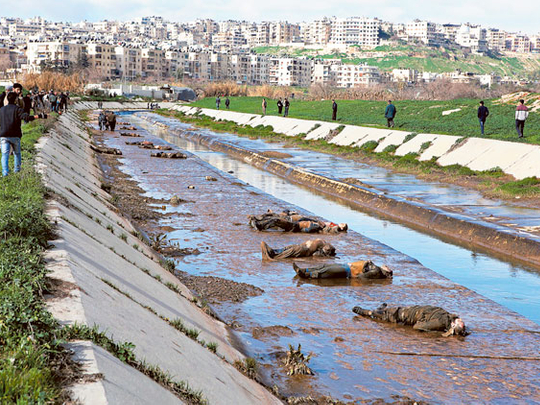
Aleppo, Syria: The bodies of at least 68 young men and boys, all executed with a single gunshot to the head or neck, were found on Tuesday in a river in the Syrian city of Aleppo, a watchdog and rebels said.
A Free Syrian Army captain at the scene said at least 68 bodies had been found and that many more were still being dragged from the water, in a rebel-held area.
The bodies were found in the Qeweiqq River, which separates the Bustan Al Qasr district from Ansari in the southwest of the city, the Syrian Observatory for Human Rights said.
“Until now we have recovered 68 bodies, some of them just teens,” said Captain Abu Sada, adding that all of them had been “executed by the regime.”
“But there must be more than 100. There are still many in the water, and we are trying to recover them.”
A volunteer said as he helped load one of the bodies on a truck: “We don’t know who they are because there was no ID on them
At least 15 bodies could already be seen on the truck, with other continuing to arrive.
Abu Sada said they would be taken to the hospital at Zarzur where relatives could seek to identify them.
“Those who are not identified will be buried in a common grave.”
The 129km river originates in Turkey to the north and flows to the southwest of Aleppo, traversing both regime and rebel-held areas.
“This is not the first time that we have found the bodies of people executed, but so many, never,” he says numbly, as he examines the body of a boy of about 12 with a gunshot wound to the back of the neck.
The Shabiha (pro-government militia) seize people crossing the checkpoint ... and they torture and execute many of them,” said Abu sada.
In video filmed by activists and published by the Observatory on YouTube, the cameraman walks along the river, less than two metres wide, and films some 50 bodies that have been pulled onto the concrete path.
Most have their hands are tied behind their backs and pools of blood trail from their heads. Their faces are white and bodies bloated.
All look to be young men, some teens, wearing jeans, button-up shirts and sneakers.
The cameraman films them one-by-one as he walks slowly down the path, then starts running toward more ahead of him
Meanwhile, rebels stormed a government intelligence complex in the oil-rich east of the country on Tuesday, freeing at least 11 people held in a prison at the facility, activists said.
After five days of heavy clashes around the intelligence compound in the city of Deir Al Zor, rebels finally overran the complex early on Tuesday following intense fighting overnight, the Britain-based Syrian Observatory for Human Rights said. Opposition figures were reportedly being held at the jail on the complex’s grounds, but it was not immediately clear whether those freed Tuesday are fighters or activists.
Government forces responded to the rebel advance by unleashing a series of airstrikes on the compound, trying to push the opposition fighters from the facility.
Deir Al Zor has been the scene of heavy fighting since the uprising against Syrian President Bashar Al Assad began in March 2011. The province, which goes by the same name as the city, is located along Syria’s border with Iraq and includes several oil installations that the rebels have repeatedly targeted.
The aid group Doctors Without Borders said last month that government forces are shelling and bombing Deir Al Zor almost daily. It said tens of thousands of Syrians, many of them wounded, remain trapped in the city.
Also Tuesday, regime warplanes also carried several airstrikes on rebel positions in restive towns and villages around Damascus, including eastern Ghouta and Yalda, and hit other suburbs with artillery, the Observatory said. The group relies on the reports from activists on the ground.
After capturing several major army bases and government outposts, the rebels control large swathes of land in northeastern Syria. Al Assad’s troops, however, continue to hold a tight grip on the capital after nearly two years of conflict.
The areas on the capital’s doorstep have been rebel strongholds since early on in the revolt. In recent months, the rebels have used them as a base from which they have been trying to push into central Damascus, the seat of Al Assad’s power.












